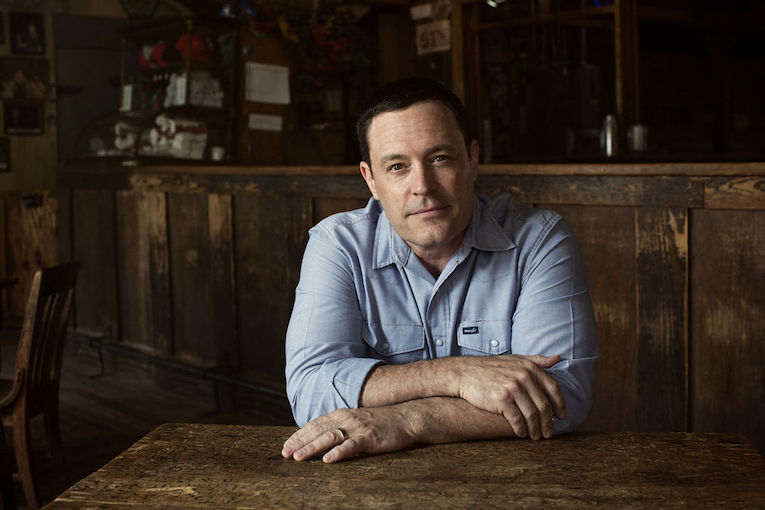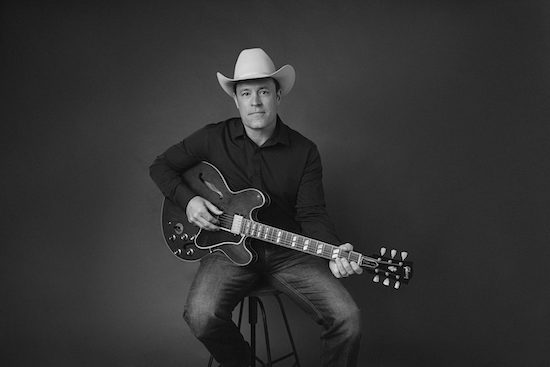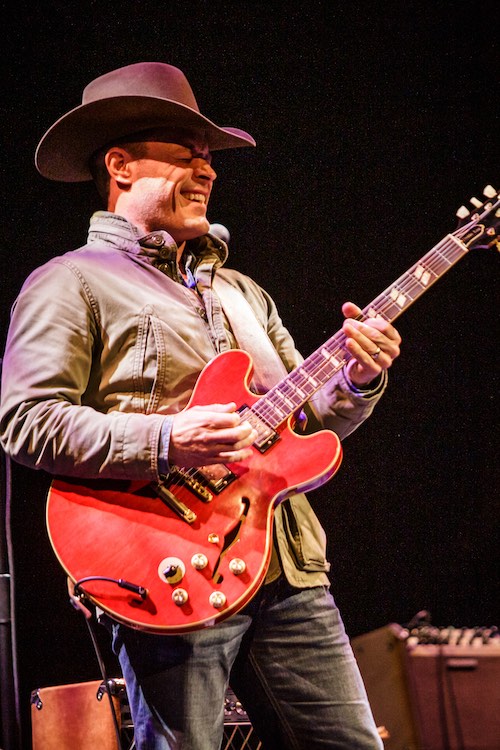
Photo: Seth James by Erin Valkner
By Martine Ehrenclou
For years, a large grassroots following has been hip to Texas singer, songwriter and guitarist Seth James. His musical blend of Texas blues, R&B, rock, country soul and rootsy funk is infectious and downright superb. His newest album, Different Hat, out August 27 via Tiny Ass Records, was produced by Kevin McKendree (Etta James, Buddy Guy, Lee Roy Parnell, Delbert McClinton, Tinsley Ellis) and features world class musicians, including guests Lee Roy Parnell on slide guitar and Anson Funderburgh on guitar. Different Hat follows James’ 2019 release Good Life.
By looking at Seth James’ Different Hat album cover you might assume his music is along the lines of George Strait. Seth James is in fact a life-long West Texas rancher clothed in cowboy hat and boots, but his music embodies the rock, soul, R&B and blues styles more aligned with Detroit, Chicago, New Orleans and Memphis. His guitar chops are virtuosic, his songwriting skills honed by years of professional songwriting with Warner Chappell Music, collaborating with Chris Stapleton, Delbert McClinton, among others. And his voice is soulful, full of personality and his music has groove. He’s toured with McClinton and other celebrated musicians, but James is so humble, you won’t hear him talk about his music career achievements unless you do a little prying. His awe-shucks approach is authentic and real, which makes a top-tier musician even more interesting.
Martine Ehrenclou: Your story is so interesting. You grew up on a working cattle ranch. Your music is a unique blend of country funk, blues, R&B, rock and even some jazz on your new album, Different Hat. How did that come about since you were pretty isolated on the ranch.
Seth James: I was pretty isolated out there, and the one radio station you did get when you were in the pickup was a ’90s country station. That’s all we had, and of course that’s what most people listened to out there. I was lucky I had a brother that grew up with my stepdad far away, a completely different life. He was a long-haired hippie surfer and he listened to all kinds of music. Very eclectic. That’s one of the things that we did together through the mail, shared music back and forth, and his music was everything from Creedence Clearwater to a lot of classic rock, and a lot of blues stuff. That was really my jumping point off for my interest in music. That’s the door I came in. How you start has a lot to do with how you finish.
Martine: Are you still working on a cattle ranch in West Texas?
Seth: I live in (town) between Austin and San Antonio. I’ve been here for about 10 years. Where I grew up, it’s about 90 miles from the grocery store. It seems pretty good on paper when a school teacher from Dallas marries a cowboy from the middle of nowhere, and then when they move back out to the ranch, it’s not always as easy as you think. I grew up watching that dynamic, and I’m not making fun of it, but I’ve seen it a lot. My wife is somewhat of a country girl, but it’s kind of one of those deals where you either live at the ranch without that wife, or you live a little closer to the grocery store and keep the wife, so I’m keeping the wife. (Laughter)
Martine: (Laughter) I can understand that. You sing with her too, don’t you?
Seth: Yes. She’s a singer, and that’s how we met. I was opening for a band that she was a singer in, and we shared a tour bus for years and were friends. We actually made a record together two years back. She’s a wonderful singer, and sings on one song on this record, which is the least amount of singing she’s done on any of my records.
Martine: Who are some of the artists who influenced you the most? You have blues and rock influences besides the groove and Country funk.
Seth: Delbert McClinton, he was a (Lyle) Lovett guy, and I grew up close to Lovett. All the Lovett guys gave me hope for possibly somebody that grew up where I grew up, to go out and do something other than their country music. Little Feat, Frankie Miller, Delbert McClinton, Freddie King. A lot of country blues guys in the beginning, like Lightnin’ Hopkins and Muddy Waters. A lot of records that I really just fell in love with. Muddy Waters’ Hard Again record, and guys like Billy Joe Shaver and Guy Clark, which to me, in a way, were blues, too.
Martine: You wrote “Moonpies” on Different Hat with Delbert McClinton.
Seth: Well, I wrote “Moonpies” with the intentions of finishing it with Delbert, and then when we went up to do the record, of course, all the pandemic stuff was going on. He was more comfortable staying at home. I sent him the song, and he was going to finish it. He changed one word. As much as I’d love to ride his coattails, I offered him the co-write, because that’s how that works, and he said, “You’re crazy.” I wrote that one by myself, I would say, with an assist from Delbert, just because he wouldn’t even accept credit. He just felt it was finished. It definitely has a Delbert vibe to it.

Photo: Eric Valkner
Martine: Speaking of songwriting, tell me about yours.
Seth: It wasn’t until I was in college. I’m might have wrote a few instrumental ditties, but when I got in my early twenties, I started writing songs. Didn’t know what I was doing, of course.
Martine: Who did in their twenties? (Laughter)
Seth: (Laughter) Yeah, no kidding. There’s a lot of other things I didn’t know much about. I ended up going to Nashville on a record deal slash publishing deal, and was navigating those waters. I was a little bit of a square peg in a round hole, but I learned a lot. I was there and wrote for Warner Chappell for three or four years, and then another publishing company, so I got a lot of reps in, as far as that old way of Nashville writing, where you just get in a room with a stranger and make songs up for day… every single day. That helped me, and I learned a lot from that. Then I had to unlearn some of those things a little bit just to get back to me. I wasn’t really writing songs for me at the time. I was just writing whatever song was in the room.
A friend of mine, Jay Knowles, was a songwriter there and we wrote together a lot, and he’s brilliant. I learned a lot from him. Chris Stapleton, who, at the time, was just as amazing as he is now. I wrote with him a lot and learned a lot from him. I wrote with a lot of good songwriters, and I was usually the helper, not the heavy. I enjoyed that time.
Martine: Groove is a big part of your musical style. Where does that rhythm come from?
Seth: I’ve always been a sucker for a groove ever since I first started listening to music. That’s the first thing I go for. My real dad, he didn’t raise me, but he was a drummer, and his dad, and his dad before him, were all musicians. My older brother was a drummer, and I’ve always just been a frustrated drummer. The groove is just paramount to me. There’s a lot of different kinds of grooves, obviously, but if the groove is not there, to me, the song is dead. People like Little Feat and that had a lot of complex rhythm going on; that’s just always kept me interested, and I thought it was more engaging for the audience.
Martine: Tell me about your guitar playing. You’ve been described as a virtuoso guitar player.
Seth: I’ll have to take your word for that. My guitar journey, so to speak, has changed a lot over the years. When I was younger, I spent a lot of time focusing on the guitar, and tone is very important. I was a guitar slinger guy, and I’m glad I went through that phase and trimmed away the fat. I’m a pretty understated person in general, and I think my playing is the same thing. Now that I’ve gotten older, I’m more comfortable with that and more comfortable with the space that comes with that. When I was younger, I think all that space probably made me uncomfortable, so I would just blabber on the guitar.
I’ve been around brilliant guitar players for a long time. When I was in Nashville, I more or less just lived with Lee Roy Parnell, and of course he’s brilliant guitar player. He had every brilliant guitar player as a friend up there. Of course, I grew up in Texas and I don’t have to tell you about guitar players in Texas. (laughter) I was drinking the same water as all these other guys. I’m self-taught and musically shallow when it comes to the ins and outs of guitar playing, but I think it’s also helped me find my voice and keep it that way.

Martine: Your song, “Real Bad Deal.” You don’t play guitar on it. It’s a beautiful slow blues and your voice is so soulful. Tell me what it was like to sing and not play your guitar on that song.
Seth: Terrifying. I’ve always admired singers. I’m a big fan of Frankie Miller and Huey Lewis and obviously Delbert, and all those guys just singing it and killing it, and not having a guitar in their hand. It’s like that movie where the guy said, “I don’t know what to do with my hands,” that’s how I felt. That song, the more we worked on it, the more that space was the beauty of the tune. I definitely wanted to have a low down, Charles Brown kind of style blues tune. A lot of it also has to do with being in the room with Kevin McKendree, who’s just brilliant on the keys. My thoughts were, “If I was to play guitar on that song, it would be so that people knew I played guitar and there’s no song-serving reason to do it.” I just had to dive head first into the fear of empty hands.
Martine: The fear of empty hands. I get that. Tell me about working with Kevin McKendree, and how did you start working with him.
Seth: I had worked with Kevin almost 20 years ago when I was in Nashville. I had already done some touring with Delbert as an opening act, and had met all of that particular group at the time. There’s a Delbert, Lee Roy contingency that includes a lot of great players and songwriters. I had a song that needed finishing and I thought Kevin was the guy, so we started writing together, wrote the tune, and then ended up making some demos soon after of that song and a few others. That was the first time we worked together, and we knew then, and even talked about it, that we were going to work together and make a record. At the time I was still signed at Sony, which sounds a little cooler than it was, but there was a big shot producer that was in charge of making my next record, so it wasn’t really something I could do at the time. Needless to say, once Good Life came around, we finally got back to it. Working with Kevin is just easy. Easy as could be.
Martine: You said you were signed at Sony. Is this before you went independent?
Seth: I guess after and before. I had put out two records, which are pretty hard to find, thank goodness, when I was in my early twenties. I hate to say they’re bad, but I just I’ve grown past them. I went to Nashville and was bounced around through that meat grinder for a while, and the record never got made. Once I got dropped, I knew I was going to be leaving town and probably not coming back for a while, so I threw together a quick session and made a record with a bunch of great players. That record was called That Kind of Man, but it was still an independent release. This label relationship I have with Good Life and Different Hat is really the first time I’ve ever had the sense that I was actually on a label, as far as the good side of what that means.
Martine: What did you do with your time during the pandemic? Did you work on Different Hat?
Seth: Everything was shut down and I had the idea, or at least the direction for the record, and felt ready. I thought, “Well, all the guys that I play with who are usually touring, either with Delbert or Bob Dylan, all those guys, big and small, great and mediocre, any musician, they were at home, just sitting. Not getting paid and not creating. Everyone. I thought, “Well, if everybody’s cool with being in the same room, then this would be a good a time as any for our creative sake and happiness sake and for progress sake.” I called Kevin and said, “Hey, let’s get the same group together if everybody’s cool with it,” and we were making a record in no time. I can’t say that that’s the only thing I got done during the pandemic. Sometimes it feels like it, but I worked. I’m a big fan of manual labor, so I did a lot of that.
Martine: What kind of manual labor do you do?
Seth: Usually I go to the ranch and just do anything that I can do. On horseback, whatever needs to be done at the ranches. If I’m not playing guitar, that’s where I’m at my happiest.
Martine: What appeals to you the most about being on the cattle ranch? I read that you’re at your most comfortable sleeping on the ground. I don’t know if that’s still true.
Seth: It is. Not because the ground is comfortable, but that’s the way I grew up. There’s a romance to it. It’s very old fashioned. I tell people that they may or may not be able to relate to that, depending on where they grew up, but if you’d ever seen the movie Lonesome Dove, it’s not a whole lot different than that. When you have the opportunity to be out, away. If they pull the chuckwagon out and you’re 60 miles from pavement, and you’re just there with a good crew and good horses and maybe good, maybe bad weather, it’s all good.
The silence and the beauty that comes with the night-time, and the morning, and the comradery. It’s just an art, like playing music. The art of being a cowboy is never-ending, just like the songwriter or guitar player.
Listen to “Raisin’ Kane” feat. Lee Roy Parnell
For more information on Seth James see here

Leave A Comment